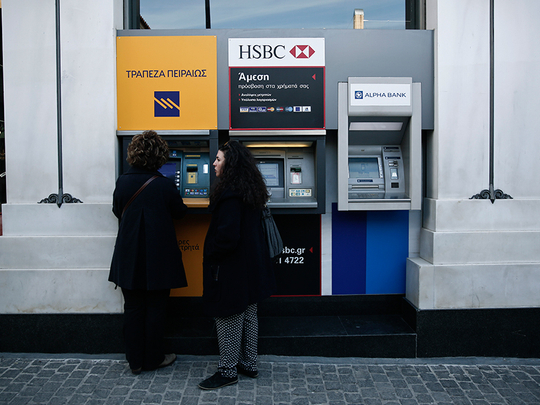
Athens: Greek Prime Minister Alexis Tsipras reaffirmed his government’s rejection of the country’s international bailout programme before Wednesday’s emergency meeting of the euro area’s finance ministers to discuss the country’s financing needs.
“We need an honest negotiation with our partners that does not condemn the Greek economy and society to unending recession,” Tsipras, 40, said in an address to parliament on Sunday, marking the start of a three-day debate on his government’s policy platform.
The leader of Greece’s anti-bailout governing coalition vowed to increase the minimum wage, restore the income tax-free threshold, halt infrastructure privatisations, and ask for Second World War reparations from Germany, in a speech that sets him on a collision course with the country’s creditors.
“It is the irrevocable decision of our government to honour the mandate of the Greek people and negotiate an end to the European Union’s austerity,” said Tsipras.
The premier came close to tears at one point during his speech.
“Tsipras’s tone was defiant and highly emotional, striking pronounced nationalist notes, from an emphasis on national dignity to his announcement that he will be seeking [Second World War] reparations from Germany,” according to Stathis Kalyvas, a professor of Political Science at Yale University. “Perhaps, his emphasis on nationalism and symbolic issues was calculated to help him negotiate concessions on economic, material issues with the Eurogroup this coming week,” Kalyvas said after the speech.
The prime minister is seeking to keep Greece financially afloat while breaking free from the shackles of its international bailout programme, which expires at the end of this month. He said he aims to reach an agreement within 15 days on “bridge programme,” which will ensure the country’s financing until June, amid doubts about Greece’s ability to pay its bills as of the end of this month. “We aim to work with our partners in Europe to achieve these goals,” he said.
Greece’s public debt stands at more than €320 billion (Dh1.3 trillion), making it Europe’s most-indebted country when measured against output. “Greece wants to service its debt, which is now over 180 per cent of GDP. It’s impossible to service as long as our partners insist on austerity,” Tsipras said.
The next showdown with Greece’s EU partners is scheduled for February 11 in Brussels, when Finance Minister Yanis Varoufakis faces his 18 euro-area counterparts in the emergency meeting.
In a lengthy list of policy actions, Tsipras said Sunday evening the government plans to restore the tax-free threshold for individual workers to €12,000 a year and gradually raise the minimum wage to €751 a month through 2016. Both measures would reverse changes made by previous governments as conditions of Greece’s bailout programme.
He said he is committed to maintaining balanced budgets, and that he is willing to negotiate terms that will make Greece’s debt sustainable.
“What we will not negotiate is the history and the dignity of our people,” said Tsipras.
His Syriza party swept into power on January 25 with promises to challenge the terms of the bailout programme provided by the EU and the International Monetary Fund.
“This speech sounded more like a continuation of the campaign trail, rather than the start of an effort to strike a compromise with peers and creditors,” said George Pagoulatos, professor of European politics and economy at the Athens University of Economics and Business. “What he said about the German loan will be a long legal process, so we don’t expect any unilateral actions. But it will be enough to infuriate the Germans.”
Tsipras told lawmakers in Athens that the government hopes to strike a more lasting arrangement with international creditors by June, even as he vowed to give a Christmas bonus to low-income pensioners, forbid foreclosures of primary residences, abolish current property tax, and rehire some public servants who were dismissed during the crisis.
“I am not in favour of handing over money to the Greeks,” Austrian Chancellor Werner Faymann said before Tsipras’s speech. “Who’s supposed to pay for that? I do however support negotiations over technical credit conditions so that the country will have more room to manoeuvre to exit the crisis.”
Jeroen Dijsselbloem, head of the group of 19 euro-area finance ministers, on Friday rejected a short-term financing agreement while Greece negotiates a successor programme to its current bailout provided by the European Union and International Monetary Fund.
Greece has received €240 billion in bailout loan pledges from the euro area and the IMF since it was shut out of bond markets in 2010, in exchange for sweeping economic overhauls and austerity measures which exacerbated the longest and steepest recession in the last half-century.
“Greece has submitted its own proposals and won’t take orders anymore via emails,” Tsipras said.











